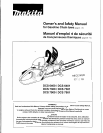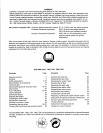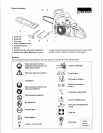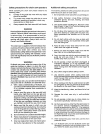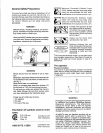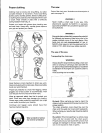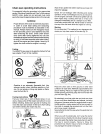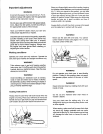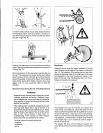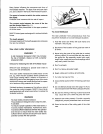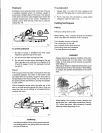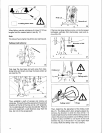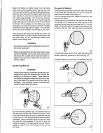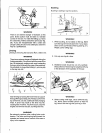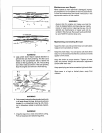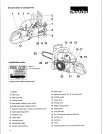
Proper
clothing
Clothing must be sturdy and snug-fitting, but allow
complete freedom
of
movement. Avoid loose-fitting
jackets, scarfs, neckties, jewelry, flared or cuffed pants,
or anything that could become entangled with the saw
or brush. Wear overalls or jeans with a reinforced
cutting resistant insert (fig. 3).
Protect your hands with gloves when handling saw
and saw chain. Heavy-duty, nonslip gloves improve
your grip and protect your hands.
Good footing is most important in chain saw work.
Wear sturdy boots with nonslip soles. Steel-toed safety
boots are recommended.
Proper eye protection is a must. Non-fogging, vented
goggles and a face screen is recommended. Their
use reduces the risk of eye and facial injury.
Wear an approved safety hard hat
to protect your
head. Chain saw noise may damage your hearing.
Always wear noise protection equipment (ear plugs
or ear muffs)
to
protect your hearing.
Continual and regular users should have their
hearing checked regularly.
Wear protective helmet,
eye and ear protection
The
saw
Parts of the chain saw: illustrations and description of
parts see page
16.
WARNING
!
Never modify a chain saw in any way. Only
attachments supplied by MAKITA or expressly
approved by MAKITA for use with the specific saw
are authorized.
WARNING
!
Bow guide bars substantially increase the potential
for kickback and severe or fatal injury due
to
the
greater kickback zone of the bow design. Bow
guide bars are
not recommended
for use on
MAKITA chain saws nor are they approved by the
ANSI
B
175.1-2000
chain saw safety standard.
The
use
of
the
saw
Transporting the chain saw
WARNING!
Always stop'fhe engine before putting a chain saw
down or carrying it. Carrying a chain saw with the
en- gine running is extremelydangerous. Accidental
acceleration of the engine can cause the chain to
rotate.
Avoid touching the hot muffler.
4
By
hand:
When carrying your saw by hand, the
engine must be stopped and the saw must be in the
proper position.
The chain protection cover should be over the
chain and the guide bar must point backwards.
When carrying your saw the
bar
should be behind
you (fig.
4).
By
vehicle:
When transporting in a vehicle, keep
chain and bar covered with the chain guard.
Properly secure your saw
to
prevent turnover, fuel
spillage and damage
to
the saw. Make sure the
saw in not exposed to heat or sparks.
6



